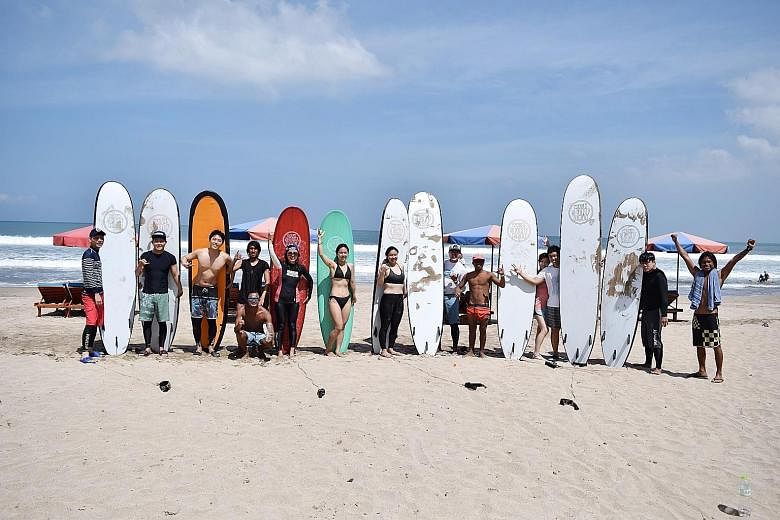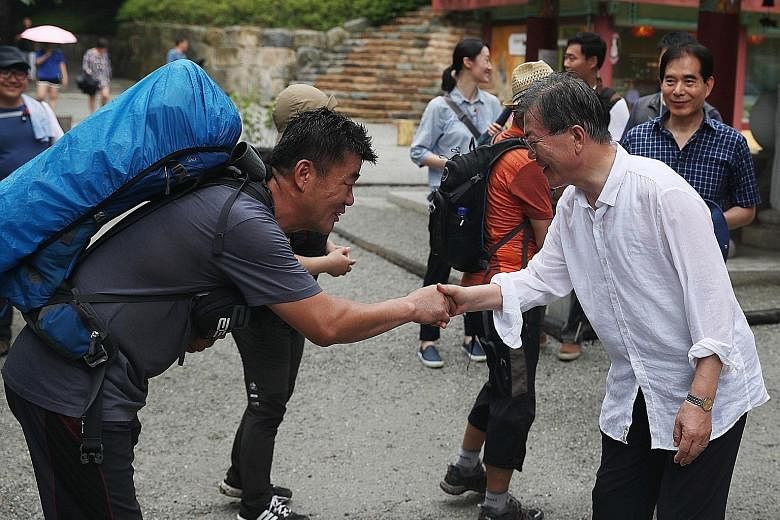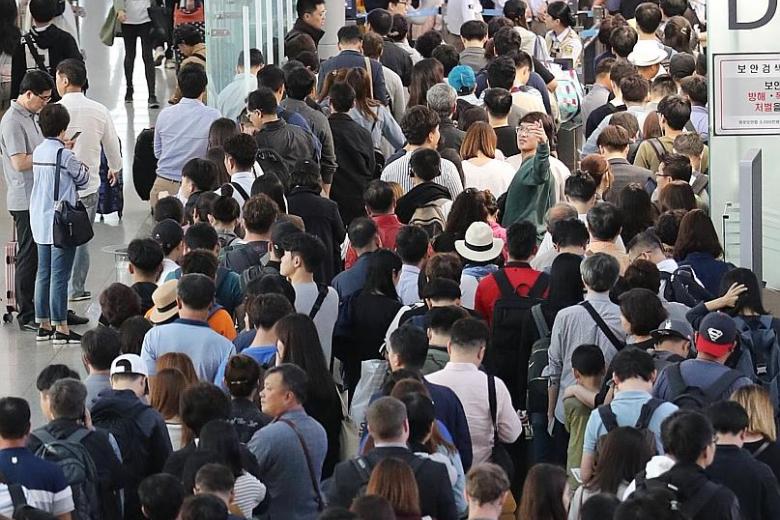Long vacations that are a rarity in South Korea are becoming reality for many people this week, as the country embraces its first 10-day break in decades.
Among them is ski instructor Lucas Son, who will be heading to Malaysia to conquer Mount Kinabalu with a friend today. Mr Son, who plans to spend up to two million won (S$2,400) on his vacation, said: "The amount is not small for me, but I think 10 days is super rare and valuable for spending big money."
Meanwhile, tour agency worker Gwen Chang is revisiting Indonesia with her husband, after a Bali trip last year. "I asked a local travel writer where is the most beautiful place in Indonesia, and his reply was Lake Toba. So I am going there," said Ms Chang, 26.
More than 1.1 million South Koreans are expected to travel overseas during the country's longest string of public holidays - 10 days starting from today to Oct 9.
This is part of a push by newly elected President Moon Jae In to get South Koreans to give themselves a deserved break at long last.
After all, overwork is a chronic problem in the country - South Koreans put in 2,113 hours at work in 2015 - the third highest among 35 countries in the Organisation for Economic Cooperation and Development, behind Mexico and Costa Rica. And there have been at least two cases this year of kwarosa - the Korean equivalent of Japan's karoshi or death by overwork.
South Korea has traditionally had shorter holidays, unlike neighbour China, which has week-long breaks during Chinese New Year and the National Day holiday in October. Its longest holidays are Seollal - the Korean equivalent of Chinese New Year - and Chuseok (Thanksgiving), both three-day holidays.
Firms in South Korea also tend to be miserly about giving employees time off. At most companies, workers are usually not allowed to take more than five consecutive days of paid leave though they are entitled to 10 to 15 days.
Mr Moon, who was elected in May, has pledged to change the country's overtime culture, promising to cut annual work hours by almost 15 per cent and increase the number of paid vacations for civil servants from 15 to 20 days a year.
-
1.1m
Potential number of outbound travellers over the Chuseok holiday this year, more than double last year's 469,000.
-
26m
Number of people which the Korea Tourism Organisation expects to travel overseas this year, up from 22.3 million last year, and double the 13.3 million a decade ago.
The long break also aims to boost consumer spending domestically while improving work-life balance.
Experts say improving work-life balance will help tackle problems like the three "lows" - of work productivity, female participation in the labour force, and birth rates.
MORE ARE GOING ON TRIPS, OVERSEAS OR WITHIN KOREA
The South Koreans will get a 10-day break starting this weekend, which includes Chuseok or Thanksgiving from Tuesday to Thursday; National Foundation Day on Friday; and Hangeul Day the following Monday.
Early this month, the national government declared Oct 2 a temporary holiday in order to make this 10-day break possible.
But not everyone will get to enjoy it. A recent survey by job site Job Korea showed that only 52.9 per cent of 1,231 respondents will get the full 10 days off. Employees of major conglomerates are more likely to enjoy the full benefits, while those of small and medium-sized companies or businesses in retail, food and beverage or tourism will probably have to work through the holidays.
Ms Julia Moon, 39, a manager in a major conglomerate, is grateful to be able to take a 12-day vacation to New York, by adding two days of leave. This would not have been possible without this year's public holiday windfall, as her company, like most other conglomerates, does not encourage workers taking more than five consecutive days of leave.
-
SOUTH KOREA'S PUBLIC HOLIDAYS
-
South Korea has about 15 public holidays a year. These are the major ones this year:
Seollal (Jan 27 to 29)
Seollal, or the Lunar New Year, is a time for family bonding, feasting on traditional foods, like teokguk (rice cake soup), and playing traditional games. Many people return to their hometowns to gather with family. -
Independence Movement Day (March 1)
Also known as Samiljeol (literally 3-1 Festival), it commemorates the first declaration of independence against Japanese rule in 1919. -
Liberation Day (Aug 15)
This marks the liberation of Korea in 1945 after Japan surrendered to the Allied forces and ended World War II in Asia-Pacific. -
National Foundation Day (Oct 3)
Also known as Gaecheonjeol, which means heaven-opening festival, it marks the creation of the first ancient state of Korea in 2333 BC. -
Chuseok (Oct 3 to 5)
Chuseok, which falls on the 15th of the eighth lunar month, is traditionally a celebration of an abundant harvest in autumn. It is the most important national holiday in South Korea, marked by family gatherings, ancestral rites and the making of traditional foods. -
Hangeul Day (Oct 9)
This celebrates the invention of the Korean alphabet by King Sejong.Chang May Choon
"I am very happy that I get to take a long vacation... I really wanted to visit New York, and I plan to visit museums and galleries and watch musical concerts," said Ms Moon, who paid more than 2.6 million won for her flight, 2.5 times the usual fare.
She applauded the government's move. "It is great. We need clearer boundaries of work and life."
Industry data shows that the number of outbound travellers over Chuseok this year could hit a record of over 1.1 million - more than double last year's 469,000.
Mode Tour, a major travel agency, said more people are travelling farther to make the best of the rare 10-day vacation. Bookings for Europe increased 77 per cent year on year, and for America, 71.7 per cent.
Overall, though, nearby countries are the most popular destinations.
Hana Tour, the country's largest travel company, said South-east Asia drew the most bookings, followed by Japan. Fewer South Koreans are headed for China, however, after bad blood between the two sides over the deployment of an American missile shield.
Domestic travel is also expected to get a big boost, with a survey by travel app Dailyhotel showing that up to 90 per cent of respondents will go on two-to four-day trips within the country. The most popular destinations are Seoul, Gangwon province in the east, where autumn leaves are due to appear late this month, the southern resort island of Jeju and southern port city Busan.
In general, more South Koreans are travelling overseas, taking advantage of an increase in budget airlines. A record 2.39 million South Koreans went abroad in July, and the Korea Tourism Organisation expects about half of the country's population - 26 million people - to travel overseas this year. This is up from 22.3 million last year, and double the 13.3 million a decade ago.
A BREAK FROM PESKY RELATIVES AND CHORES
On a lighter note, going on vacation during Chuseok is a way for many South Koreans to avoid distant relatives who ask prying questions like "When are you getting married?" and "How much money do you make?"
For married women especially, it is a way of escaping the stress that comes with exhausting chores, including the preparation of traditional foods like jeon (pancakes with seafood and vegetables) and songpyeon (glutinous rice cake) for ancestral rites.
Mrs Jenny Cha, who is in her mid-30s, got an earful from her mother-in-law when she and her husband travelled to Taiwan in 2010 over the Chuseok break. "She really flipped, giving us a long and hard lecture about why we should show up for rites at my husband's uncle's house, and how it's a sign of no respect if we don't go. But the other cousins also started dropping out in the following years and she loosened up."
This year, the Chas will be going on a cruise in Europe with their two young children, a trip that will set them back 12 million won. "My husband said it's a birthday gift for me and our elder daughter."
Mrs Cha, a housewife, said such a long vacation is rare as her husband's company does not have a proper leave system. "The only time he can freely take a vacation is when the whole company is off, like during Chuseok," she added.
While this upcoming long holiday is a good start, experts say changing the country's entrenched overwork culture will likely be a long haul.
Dr Ijin Hong, a research professor at Yonsei University's welfare studies research institute, told The Straits Times: "The government has perhaps too much confidence in what can be done at a policy level, whereas reality works in a different way. It's a tricky problem to address because it has to do with changing the corporate culture.
"This is not a simple thing to do, it takes time and effort."



